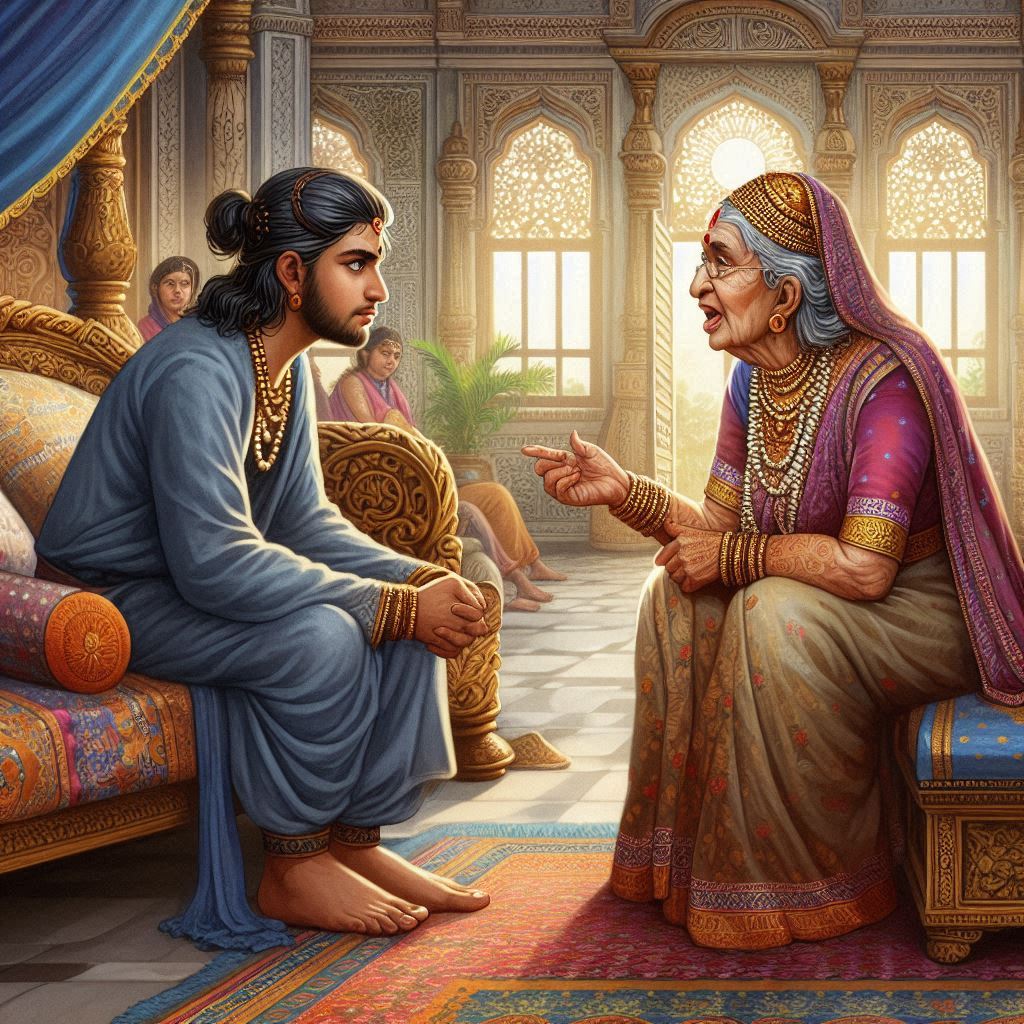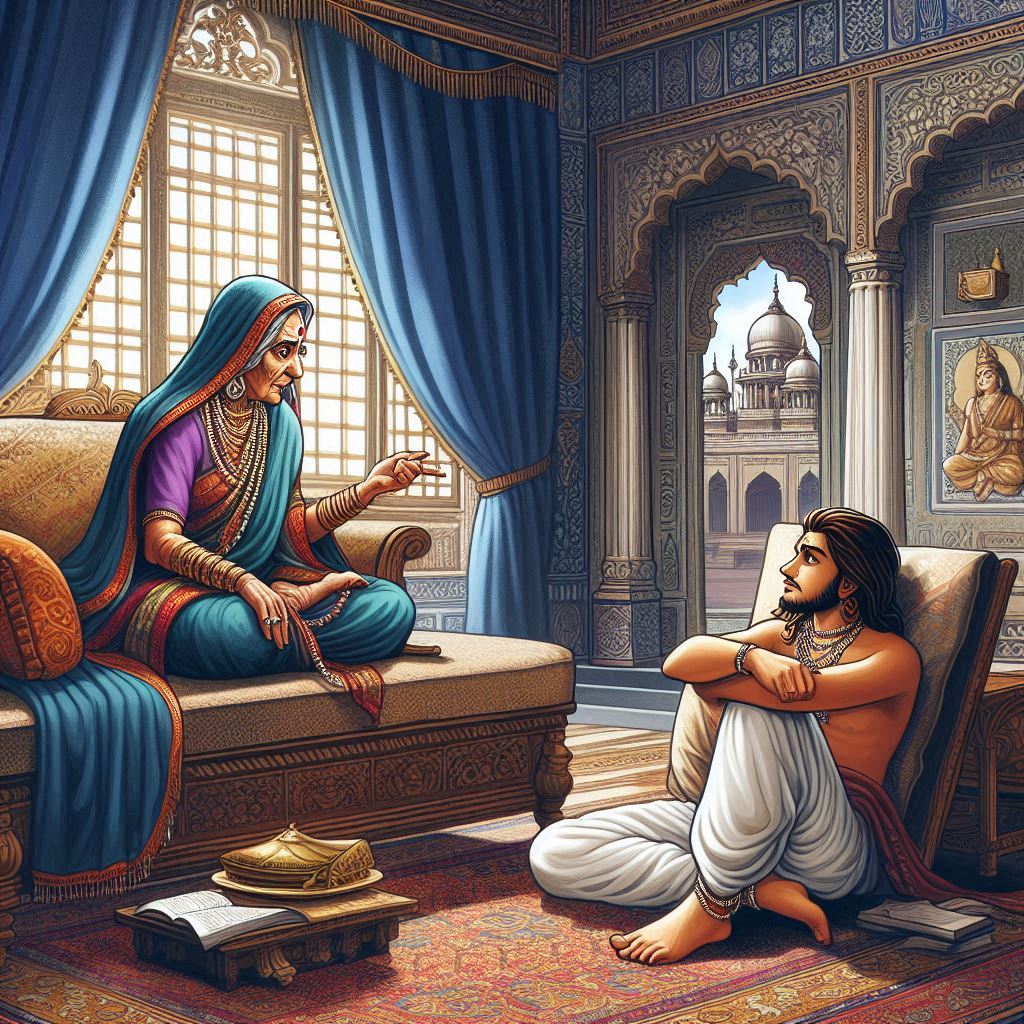The Conversation Between Vidula and Her Son – Stories from Udyoga Parva
Kunti narrated a conversation between Queen Vidula and her son to Krishna and asked him to share it with her sons, the Pandavas, to inspire them for the war.

Krishna’s peace talks didn’t convince Duryodhana. In fact, Duryodhana and his trusted advisors (Karna, Shakuni, and Duhshasana) planned to imprison Krishna so that he wouldn’t help the Pandavas. Krishna found out about this and left the palace after displaying his vishwaroop. He went to Vidhura’s quarters to meet Kunti before returning to Upaplavya.
Kunti welcomed Krishna and gave a firm message to her sons to inspire them to fight the war for what was their right. She knew Yudhistira was a peace-loving person and knew he needed a boost from her to avenge Draupadi’s insults and get back their kingdom. She spoke to Krishna about how hard her situation was when she had to live at the mercy of relatives, when her powerful sons were alive. She then narrated a story of Vidula, a widowed queen, and her son, Sanjaya, to encourage the Pandavas to fight the war with all their strength.
A long time ago, there lived a widowed queen and her son, who took up the reins to the throne. Her son was defeated by the king of Sindhu in an attack. This affected him so much that he gave up his responsibilities as a ruler and was willing to hide in the palace rather than risk his life.
Vidula, being a true Kshatriya woman, disliked her son’s attitude and censured him to stop being lazy and a coward. She looked at her son lying on the bed and was angered by his indifference. She asked where he came from since neither she nor his father (her dead husband) were cowards who ran away from enemies. She said he would remain hopeless for the rest of his life if he didn’t act when necessary and reminded him that his dharma as a Kshatriya king was to protect his subjects from danger. She asked why he was lying down like a corpse when he should have been circling the sky like a hawk to find the enemy’s weakness and swoop to attack. Vidula ordered her son to be strong and do his dharma without worrying about the results. She bemoaned that she gave birth to Kali instead of a valorous son and said no other woman should have such useless sons.
Sanjaya, the young king, didn’t like her taunts. He asked if the world and the treasures would mean anything to her if she didn’t have a son to love.
Vidula advised him not to follow the oath of those deserted by their servants and depend on others. She said that a man’s life is purposeful when other living beings depend on him and not the other way around. A brave person who ensures the happiness of his relatives and subjects would lead an auspicious and virtuous life. She continued her speech and said he would lead an inferior life if he gave up his responsibilities. A Kshatriya who didn’t display his powers when necessary was equal to a thief. She lamented that her words weren’t making an impact as they should. Vidula reminded her son that even though the king of Sindhu was strong, he wasn’t invincible, and a calamity would bring him down. She advised him to conduct meetings with allies and launch a planned attack.
Vidula also said she made a mistake by naming him Sanjaya since he didn’t display any signs of it (Sanjaya means a person who brings victory). She urged him to fight instead of turning his back. Vidula spoke about how she was born into a powerful lineage and was married into another and enjoyed the luxury of wealth. She demanded how he could not be affected seeing her and his wife in a state of weakness, and why he didn’t do anything to change the situation. She told him to stop clinging to life and do the needful by defeating his enemies. A brave warrior became famous by killing an enemy. She gave Indra as an example and how slaying Vritra made him the king of heaven.
Vidula added that the kingdom was the road to heaven for those who fulfilled their responsibilities and warned her son not to let any of his enemies see him in such a dejected state. She reminded Sanjaya that he was young and strong and had the ability to regroup and fight again. Instead of bending or surrendering to the enemy, she wanted him to bravely fight and do his best to protect the interests of his subjects. She concluded by saying he should live the same way with or without allies by his side.
Sanjaya wasn’t convinced. He still tried to justify his stance and said that his mother’s heart had turned to steel. He moaned that she had no compassion and didn’t care that her only son could die on the battlefield and leave her alone. He asked once again what she would do with the ornaments if he were dead.
Vidula was disappointed. She explained to her son that she had done everything to steer him on the path of dharma and artha, as it was the right time for him to act for his kingdom. She said that he would be committing a sin and an act of cruelty if he didn’t do his job. A Kshatriya was born to fight and be victorious, and hence he should accept his responsibility and protect his subjects even if it put his life at risk.
Sanjaya protested and yet again said she had no compassion for her child.
Vidula was firm. She wasn’t going to let her son abandon the subjects at the mercy of another king. She said she rather liked that he thought of her that way, as it allowed her to push him more. She added that she would honor him when he defeated the Saindhvas (Sindhus) who attacked their kingdom.
Sanjaya knew he couldn’t convince his mother with emotional blackmail, so he decided to ask for help. He said the treasury was empty, and he did not have allies to support him. He said he saw no means for him and asked her to guide him.

Vidula was happy to see the change in her son. She told him not to demean himself because of his previous failures and to be confident in his skills. The fruits of deeds weren’t meant to be permanent, but if one didn’t act, they would never attain success. She said a person should rise again even if he fell a few times. She advised her son to find ministers, subjects, allies, etc., who disliked and actively hated the king of Sindhu. They would be useful to create a conflict. Vidula instructed him to approach these men with gifts and do it quickly before others did. She said that the enemy was too powerful for an attack; he should strive for conciliation by being friendly. She said that if a person could convert an enemy into an ally and gain their trust, he could think of regaining the lost kingdom. She continued that challenges and calamities shouldn’t dislodge the person from his path. The process was meant to be difficult, and it would be worth the effort. When a king displayed his vulnerability, it would affect the subjects too and demoralize them. They may seek refuge with the enemy and desert their king.
She advised him to prevent such developments by acting quickly and told him not to be frightened or display his worries. She then revealed that they had a large treasury he didn’t know about, and that would help in collecting allies and attacking his enemy to regain the kingdom. She also told him about certain loyal well-wishers who wouldn’t desert him and would help him find victory.
Sanjaya said she had inspired him with her speech, and her advice and intelligence helped cast away the darkness in his mind. He called her his leader and promised to be the king his subjects deserved. He said he would do his best to defeat his enemies and come back victorious.
Vidula was relieved and happy. She blessed him to be successful. Sanjaya followed her advice to the dot and achieved the goal of defeating the king of Sindhu.
Kunti concluded the story by saying these words had immense power and were called Jaya (victory). She hoped her sons would listen to the same words from her (through Krishna) and achieve their victory. She said that those who heard the story were sure to be victorious. A woman would give birth to a warrior-like son if she heard this story during her pregnancy.
Kunti sent more messages to each of her sons, highlighting their talents and reminding them of their duty as Kshatriyas. She also sent a message to Draupadi that she had always behaved as she would with her husbands (implying that she supported her daughter-in-law in words and actions).
Krishna took her blessings and left, promising to convey her messages and do his best to help the Pandavas win the war.
